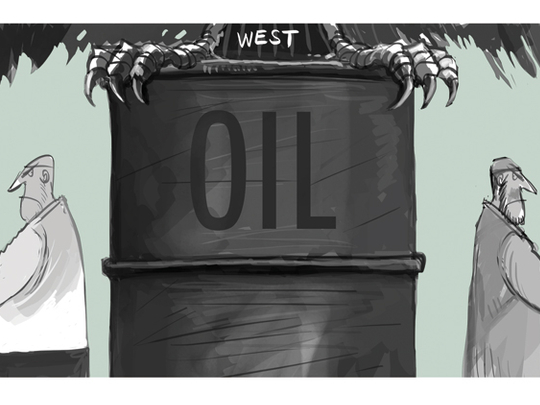
Justifying the Nato-led military intervention in Libya, which far exceeded the mandate provided by UN Security Council resolution 1973, the US promised that the new, liberated Libya would become a regional beacon of justice and democracy.
How paradoxical, then, that last Tuesday brought us the news that a squad of US commandos had kidnapped a second Libyan citizen, Ahmad Abu Khatallah (the first being Abu Anas Al Libi, last October) and removed him for trial in New York accused of terrorism. An action that is prohibited under international law.
Libya’s Justice Minister, Salah Margani, confirmed that Abu Khatallah was wanted in Libya and asked the Americans to return him for trial in Libya. Washington is highly unlikely to comply with this request because it has no faith in Libya’s justice system which, like the rest of the state apparatus in that unfortunate country, is on the brink of total disintegration.
So what has gone wrong? First and foremost, it is now clear that the Nato intervention was fuelled mostly by self-interest with twin aims — to topple Muammar Gaddafi and secure Africa’s largest oil supply. These achieved, ‘liberated’ Libya was abandoned without the barest essentials required for state-building and national security. A fledgling government composed of politically inexperienced opposition figures and guerrilla leaders struggled to lay the foundations of the post-revolutionary state in the midst of a violent struggle for power between tribal, ethnic and religious factions. Not surprisingly, they have failed.
For all his undeniable wrong-doing, Gaddafi — like King Idris before him — managed to hold together the demographically diverse elements of Libyan society. The vacuum left by his demise was swiftly filled by warring militias and Islamist groups of various hues.
There is no centralised security apparatus or effective regular army left in Libya. The farcical tale of what befell the Libyan oil tanker, Morning Glory, in March is a vivid illustration of just how chaotic the situation is. Bearing 200,000 barrels of Libyan oil, the Morning Glory was commandeered by armed rebels intent on selling the fuel without the inconvenience of involving the government (which is meant to own it). The Libyan navy had no boats to deal with the crisis (they were all sunk in the course of Nato’s air raids) and neither the tiny regular army nor the air force responded to the then prime minister, Ali Zeidan’s calls for help. A force of loosely allied revolutionary militias was hastily assembled and gave chase in a ship, turning back when a tannoy on the tanker announced that ‘armed security’ was on board. American navy Seals, stationed off Cyprus, finally boarded the tanker and brought the escapade to an end.
Indeed Zeidan’s hectic political career also offers an excellent example of Libyan anarchy. Last October, he was kidnapped on his way to work by an armed militia. Shortly after the Morning Glory debacle he was sacked by the Islamist-dominated parliament, temporarily replaced by the Defence Minister and then Ahmad Maiteg whose election was subsequently declared ‘unconstitutional’ (though the constitution is still being written) by the Libyan High Court. On Friday, Zeidan re-appeared in Tripoli, declaring himself to be the ‘real prime minister’.
Having panicked by the phenomenal rise of the Islamic State of Iraq and Levant (Isil) in Iraq, the US is once again preparing to intervene in Libya, which has itself become a hotbed of Islamist militancy and is awash with an estimated 15 million rifles and other weapons. Libya has a long historical association with Islamist ideology and Libyans feature prominently in the Al Qaida roll call. The country also produced one of the Islamists’ 20th century icons, Omar Al Mukhtar.
Crushing the Islamists has become the West’s most urgent regional concern and this — rather than offering the fledgling state a helping hand — will dictate the agenda in Libya for the foreseeable future.
On a recent trip to Tunisia, I met some figures from the former Gaddafi regime. They told me that they were regrouping, and spoke with renewed confidence of a challenge to the current regime. Significantly, they claimed to have the backing of two of Libya’s largest tribes, the Tarhuna and the Warfalla.
Like the West, and like the renegade General Haftar (whose fourth bid for power in Libya may well succeed), the ex-Gaddafi faction are prioritising the struggle against the Islamists. A deeply ironic marriage of convenience between the US and the remnants of the regime it deposed may be on the cards.
Ultimately, the widening fault lines in Libya may see the country’s geo-political history repeated. Modern Libya was once three distinct entities: Barqa (also known as Cyrenica), Tripolitania and Fezzan. Today’s inhabitants of ancient Barqa have already declared their independence from Tripoli; the major sticking point here is that nearly all Libya’s oil lies in this one region.
Balkanisation is increasingly talked of as a solution to Libya’s current turmoil. The colonial principle of ‘divide and rule’ is well-known and is making a come-back in the Middle East. Libya and Iraq, united under ‘strong men’, represented a fearsome threat to western regional interests and Israel’s security. In both cases, western military intervention fragmented previously harmonious societies and ushered in the precursors of a failed state.
But the future of Libya is not — or certainly should not be — about a western agenda, or even the interests of the West. The international community, and the Arab countries in particular, should help and encourage the Libyans in a process of national reconciliation. A political consensus must be found which sees the country’s massive oil wealth used to improve life for the population of just six million souls.
Any other outcome would mean that the revolution was for nothing, and that the blood of 100,000 Libyans was spilled in vain.
Abdel Bari Atwan is the editor-in-chief of digital newspaper Rai alYoum: http://www.raialyoum.com. You can follow him on Twitter at www.twitter.com/@abdelbariatwan









